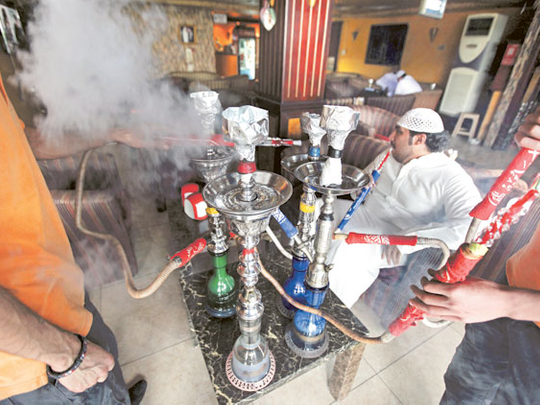
Dubai: Shisha cafes could be banned from residential areas if a new proposal — revealed on Thursday — is approved.
The proposal was revealed on the last day of the Gulf Symposium on Tobacco Control.
Speaking to Gulf News, Dr Wedad Al Maidour, head of the National Tobacco Control Programme and director of Primary Health care Centres from the Ministry of Health, Dubai, said policies to control shisha tobacco production, distribution and consumption had been proposed under a bylaw for the federal law.
“Shisha cafes will no longer be allowed to operate in residential areas. We expect to ban several cafes once the policy is passed,” she said.
The proximity of cafes in and around residential complexes poses a serious risk to residents, especially youth, she explained. “Shisha smoking is dangerous, but teens tend to think of it as an opportunity to socialise, and consider it as a cool experience. Unfortunately it is being marketed with labels like ‘herbal’ and ‘fun’.”
She also said the Ministry wanted to deter people from using shisha smoking cafes as meeting hubs and dissuade them from smoking for long periods.
Of the proposed policies, she said: “Shisha home delivery service will no longer be permitted. Enclosed shisha areas will be replaced with open-air cafes, permitting only a few tables to offer shisha service. In terms of permissible age, teenagers and parents with young children will not be allowed. Warning labels will be introduced on shisha tobacco and shisha smoking apparatus.”
Shisha myths
Shisha smoking tends to be viewed more favourably than cigarette smoking due to several misconceptions, said speaker Dr Fayez Basta, head of smoking cessation services of the Tobacco Control Programme, Ministry of Health, Saudi Arabia.
He said: “Most of the water pipe smokers think that is a safer method of smoking tobacco compared to cigarettes. They think that the passage of smoke through the water filters and absorbs the toxic substances. This isn’t true.”
He explained that nicotine as well as several harmful chemicals present in shisha tobacco affects the smoker, causing nicotine addiction. He said: “Toxic substances like carbon monoxide (CO) gas and carcinogens [agents that can cause cancer] are not filtered in water. In fact, shisha smoking is worse than cigarette smoking. One hour of shisha session results in seven times more CO gas than one cigarette. The nicotine too is 1.7 times more in shisha.”
Of the long-term dangers of shisha smoking he said a daily shisha smoker is exposed to the same nicotine content experienced by a person smoking two cigarettes a day. “Regarding carcinogenic substances, an hour of shisha smoking exposes the smoker to 46 times more than one cigarette,” he said.
Speaking on the importance of raising awareness against the harmful effects of shisha smoking, he said misconceptions need to be rectified. “More studies should be conducted to fully understand the harmful effects, and these findings should be shared with the public. This will help change the smokers’ attitude and pattern. There should be legislation to control the production and distribution of inferior quality tobacco used in shisha. The places that offer shisha too should be regulated.”












